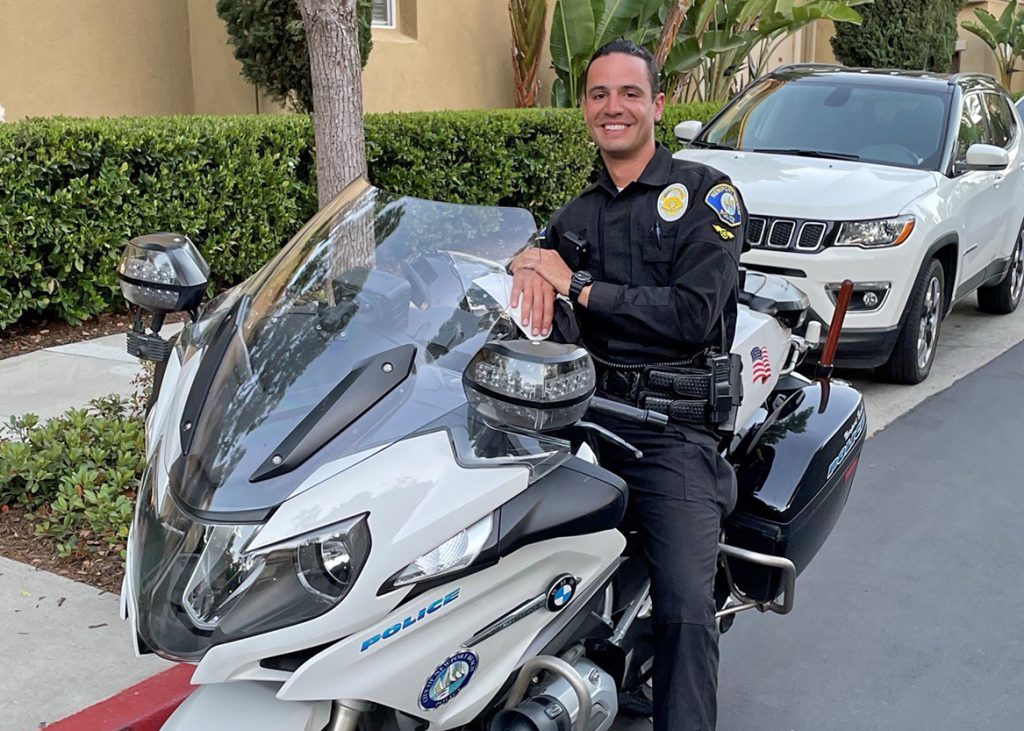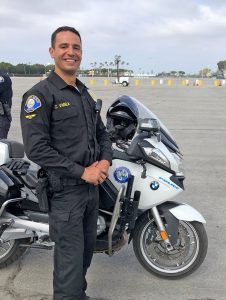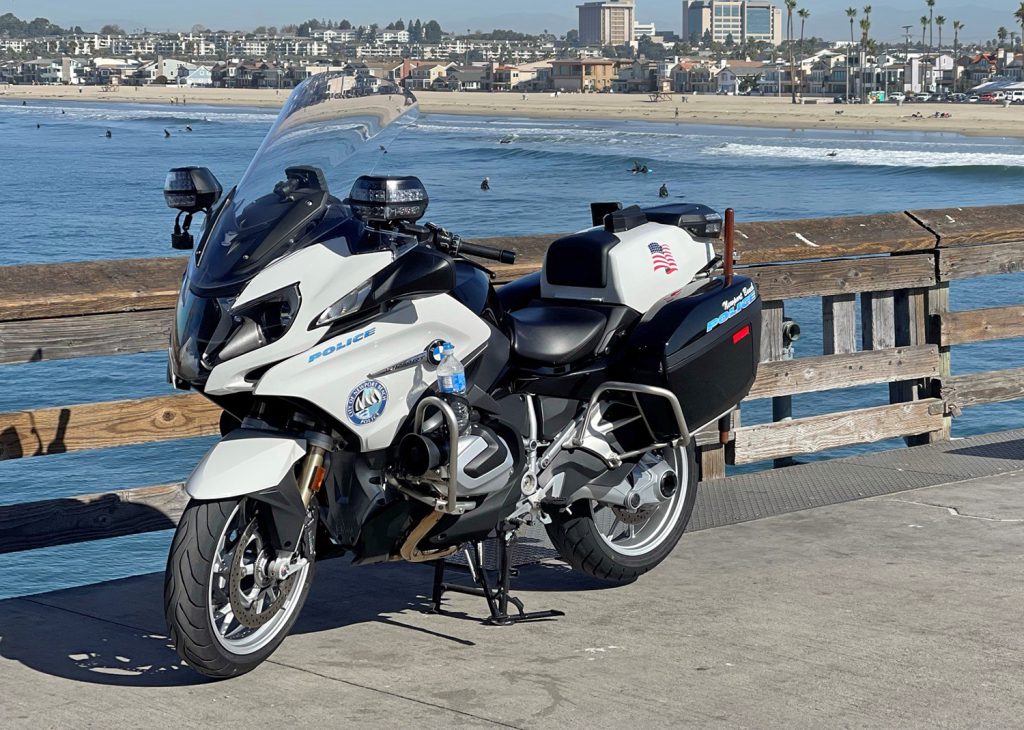
Ever since he was a kid, 33-year-old Zachary Varela dreamed of being a chef in his own restaurant. He lives for fine food, travels the world to sample the exotic fare in exotic lands, and most recently refineds his palate in the sophisticated dining rooms of the more elegant cruise ships.
In fact — donuts aside — he may very well possess the most discerning taste buds of any of his fellow motorcycle cops in the Newport Beach Police Department.
Dreams don’t always come true. A career in the kitchen seemed to evaporate faster than a forgotten pot of Vichyssoise on the stove after he joined the Marine Corps right after high school.
Four years later, all muscled up, Sgt. Varela left the service to enter college, but abandoned the slow life of academia to follow his family into law enforcement. His father is a retired California Highway Patrolman, while his mom and stepdad both retired several years ago as sergeants with the Newport Beach PD. In fact, mom, Penny, was a well-recognized motorcycle officer, in large part because of her long braid trailing in the wind like a blonde pennant from beneath her motorcycle helmet.
No college degree in Psychology or Human Behavior, Varela feels, can prepare one to become a street cop faster than working in a jail environment, which he did for three years as an Orange County Deputy Sheriff. The closest most of the inmates came to formal literacy was having the proverbial book thrown at them, but all were great teachers in their own right. They knew how to read people. They taught Varela how to understand a segment of society that requires officers to size-up, decipher and interpret — instantaneously.
For the most part, jail is a Vitamin D-deficient environment: tense, noisy, fluorescent and mostly indoors. Varela is an outdoors guy, having been a cross-country and track athlete in high school, a Marine, and serious motorcycle rider — all reasons enough to resign from the sheriff’s department to join his family at the NBPD.

Motor Cops Do More Than Ticket
Most people think that all motor cops do is issue tickets, and Varela admits “That is my prime responsibility.” But he’s quick to add, “We’re not out to penalize people, but to decrease the number of traffic collisions. It’s a safety issue rather than a penalty issue.” He personally writes about 1,400 tickets annually, while all eight motor officers in total issue about 10,000 citations, whose fines generally range between $300 and $500. He clarified that fines go not to the city, but to the court system and state to help fund safety programs.
“There is no such thing as a routine traffic stop,” he shared. “Each one is different, because you never know what the mindset of a driver (or passengers) is. You can’t prioritize the possible dangers, because all dangers are instantaneous. It’s requires multi-analysis in the moment. And all of this is what makes this job so exciting,” Varela exclaimed.
Beyond writing tickets, a motor cop must help to unclog traffic jams, diffuse driver disagreements at fender benders, take charge at life-taking and heart-breaking collisions, occasionally pursue robbers, respond to burglar alarm calls in a safe and timely manner, chase down speeders in stolen cars, navigate normal traffic (often in fog, high winds, stifling heat or seasonal downpours), and issue citations for drivers on their cellphones.
A motor officer’s job is both active and reactive; they never know what they’ll come upon during their patrols, or where or when Dispatch might send them during their normal four-day-a-week, 10-hour shifts.
However, being a motor officer also means “I’m on call 24-7,” Varela said. That is why motor officers drive their motorcycles to and from home. Short of owning a private helicopter, there is no faster means to reach the department HQ or a particular Newport location than via his department-assigned BMW R1250 RT.

No need to beef up performance—it’s a stock machine capable of speeds in excess of 140 mph, but tricked out with cop stuff: crash bars, lights, sirens, radio equipment and weapons stations.
“Beemers handle day-to-day heavy wear-and-tear with ease; they make solid motorcycles,” Varela attested.
Recently, while chasing robbery suspects that hit Fashion Island’s Neiman-Marcus for their fine selection of luxury handbags, Varela had to give up the chase when his speed got too high to be considered safe. Fortunately, sheriffs on the I-405 Freeway intercepted and apprehended all four suspects. Although many of the bags were recovered in the suspects’ vehicle, “Louis Vuitton” suffered countless scrapes and scratches when tossed out the windows during the attempted evasion.
Of his many motorcycle pursuits, “Only two suspects have gotten away.” Varela recounted with a proud, but sly smile.
As if a full workweek astride a motorbike is insufficient, Varela just purchased for his personal use a Harley Davidson “Pan America,” ruggedly suitable for chasing off-road adventure, or sportily commuting to his favorite restaurants. Despite his love for two-wheel, high-performance transport, “I don’t advise my friends or family to ride motorcycles: it’s just too unsafe in our area traffic,” he said.
There are several requirements to become a motorcycle cop: a desire to even apply, the possession of a valid California State Motorcycle License, the acknowledgement that additional skill sets are required beyond pointing the machine down the road and twisting the throttle, the strength to singlehandedly right a tipped-over motorcycle that weighs nearly 900 pounds, and a willingness to undergo a month of intense training that includes inching down a narrow, serpentine path without striking any traffic cones (or falling over).
Today, Officer Zach Varela is right where he wants to be with the Newport Beach PD. Everything considered, says Varela, on “balance” being a motor officer is the best job in law enforcement.
